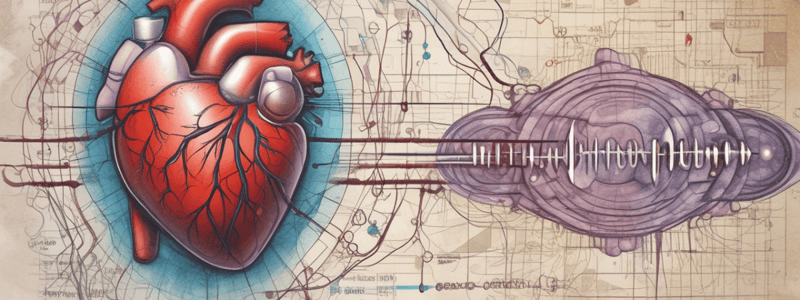Podcast
Questions and Answers
What are the underlying mechanisms that contribute to the development of atrial fibrillation, and how do they disrupt the normal cardiac conduction pathway?
What are the underlying mechanisms that contribute to the development of atrial fibrillation, and how do they disrupt the normal cardiac conduction pathway?
Atrial fibrillation is caused by abnormal electrical impulses that originate from the pulmonary veins, which can be triggered by various factors such as hypertension, coronary artery disease, and valvular heart disease. These abnormal impulses disrupt the normal cardiac conduction pathway by creating multiple reentrant circuits, leading to rapid and irregular atrial contractions.
Describe the differences between ST-segment elevation myocardial infarction (STEMI) and non-ST-segment elevation myocardial infarction (NSTEMI) in terms of their pathophysiology and clinical presentation.
Describe the differences between ST-segment elevation myocardial infarction (STEMI) and non-ST-segment elevation myocardial infarction (NSTEMI) in terms of their pathophysiology and clinical presentation.
STEMI is characterized by a complete blockage of a coronary artery, leading to a transmural myocardial infarction, whereas NSTEMI is caused by a partial blockage, resulting in a subendocardial myocardial infarction. The clinical presentation of STEMI typically includes severe chest pain, ST-segment elevation on ECG, and a high risk of cardiac arrhythmias and death, whereas NSTEMI often presents with milder symptoms and no ST-segment elevation.
What is the purpose of a focused cardiac assessment, and what components should it include to ensure comprehensive evaluation of a patient with cardiovascular problems?
What is the purpose of a focused cardiac assessment, and what components should it include to ensure comprehensive evaluation of a patient with cardiovascular problems?
A focused cardiac assessment aims to identify cardiac-related problems and potential complications. It should include a thorough medical history, physical examination, and diagnostic tests such as ECG, echocardiogram, and biomarkers to evaluate cardiac function, rhythm, and structure.
Discuss the role of beta-blockers in managing atrial fibrillation, including their mechanism of action, benefits, and potential adverse effects.
Discuss the role of beta-blockers in managing atrial fibrillation, including their mechanism of action, benefits, and potential adverse effects.
Explain the principles of thrombolytic therapy in managing acute coronary syndromes, including the benefits and risks of this treatment approach.
Explain the principles of thrombolytic therapy in managing acute coronary syndromes, including the benefits and risks of this treatment approach.
Flashcards are hidden until you start studying
Study Notes
Aetiology of Atrial and Ventricular Arrhythmias
- Atrial arrhythmias can be caused by:
- Cardiac conditions such as coronary artery disease, cardiomyopathy, and valvular heart disease
- Electrolyte imbalances (e.g. potassium, magnesium)
- Medications (e.g. digoxin)
- Thyroid disorders
- Ventricular arrhythmias can be caused by:
- Ischemia or infarction of the heart muscle
- Cardiac conditions such as cardiomyopathy and coronary artery disease
- Electrolyte imbalances (e.g. potassium, magnesium)
- Medications (e.g. anti-arrhythmics)
Pathophysiology of Atrial and Ventricular Arrhythmias
- Atrial arrhythmias:
- Abnormal electrical activity in the atria leads to rapid or irregular heart rhythms
- Can cause symptoms such as palpitations, dyspnea, and fatigue
- Ventricular arrhythmias:
- Abnormal electrical activity in the ventricles leads to life-threatening heart rhythms
- Can cause symptoms such as palpitations, chest pain, and loss of consciousness
Aetiology of Acute Coronary Syndromes
- Acute coronary syndromes (ACS) occur when there is a sudden reduction in blood flow to the heart muscle
- Causes of ACS include:
- Plaque rupture or erosion in a coronary artery
- Blood clots or thrombi formation
- Coronary artery spasm
Pathophysiology of Acute Coronary Syndromes
- ACS can lead to myocardial ischemia or infarction (heart attack)
- Ischemia can cause symptoms such as chest pain, shortness of breath, and fatigue
- Infarction can lead to permanent damage to the heart muscle
Comprehensive Focused Nursing Assessment
- Assessment should include:
- Review of symptoms and medical history
- Physical examination (e.g. vital signs, cardiac examination)
- Electrocardiogram (ECG) and other diagnostic tests (e.g. troponin levels)
- Patient education and health promotion
Nursing Management of Atrial and Ventricular Arrhythmias and Acute Coronary Syndromes
- Atrial arrhythmias:
- Administer medications as prescribed (e.g. anti-arrhythmics, beta blockers)
- Monitor ECG and cardiac enzymes
- Provide patient education on symptoms and self-care
- Ventricular arrhythmias:
- Administer medications as prescribed (e.g. anti-arrhythmics, beta blockers)
- Monitor ECG and cardiac enzymes
- Provide patient education on symptoms and self-care
- Acute Coronary Syndromes:
- Administer medications as prescribed (e.g. thrombolytics, anti-platelets)
- Monitor ECG and cardiac enzymes
- Provide patient education on symptoms and self-care
- Implement oxygen therapy and pain management as necessary
Interdisciplinary Management of Atrial and Ventricular Arrhythmias and Acute Coronary Syndromes
- Collaboration with healthcare team, including cardiologists, interventional cardiologists, and cardiothoracic surgeons
- Development of individualized care plans, including medications, lifestyle modifications, and follow-up care
- Patient education and health promotion to prevent recurrent episodes and improve cardiovascular health
Studying That Suits You
Use AI to generate personalized quizzes and flashcards to suit your learning preferences.




